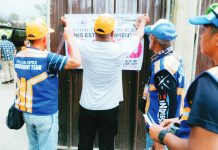
[av_one_full first min_height=” vertical_alignment=” space=” custom_margin=” margin=’0px’ padding=’0px’ border=” border_color=” radius=’0px’ background_color=” src=” background_position=’top left’ background_repeat=’no-repeat’ animation=”]
[av_heading tag=’h3′ padding=’10’ heading=’STL expands in Negros Oriental’ color=” style=’blockquote modern-quote’ custom_font=” size=” subheading_active=’subheading_below’ subheading_size=’15’ custom_class=”][/av_heading]
[av_textblock size=” font_color=’custom’ color=’#0a0a0a’]
Saturday, February 4, 2017
[/av_textblock]
[av_textblock size=” font_color=’custom’ color=’#0a0a0a’]
DUMAGUETE City – Negros Oriental was among the 56 areas where Small Town Lottery (STL) operations were expanded in a bid to raise government revenue and curb illegal gambling.
Philippine Charity Sweepstakes Office (PCSO) local branch manager Belena Alvarez said Four Aces, with office in Cebu province, has been granted an authority to operate the STL in Negros Oriental.
But the company will have to coordinate with the local branch for the submission of its Presumptive Monthly Retail Receipts (PMRR), or projected monthly income.
Currently 112 lotto outlets were operating in Negros Oriental. They were not restricted as to the number of outlets to be put up as long as they comply with the distance requirement — 100 meters from schools and 50 meters from another lotto outlet.
Alvarez said the local branch office was receiving an average of 25 to 30 requests for hospital and medicine assistance every day.
With the STL, the PCSO will be able to augment funding of medical programs for the poor, said Alvarez. As local branch manager, she can sign up to P50,000 for the hospitalization of local patients.
The STL is also aimed at eradicating illegal gambling, locally known as “swertres.”
In the STL, 55 percent of the income goes to the prizes, 30 percent to charity and only 15 percent to the operation, while in illegal “swertres,” not a single centavo goes back to the government, she said.
Through the PMRR, the operator is required to submit daily remittances so income can be computed regularly. Without it, the authority to operate can be revoked, Alvarez said.
Meanwhile the Catholic Church continuously opposes gambling, legal or not.
It is immoral, against the true essence of economic development and against the cultural welfare of the people, said Monsignor Gamaliel Tulabing, spokesperson for the Diocese of Dumaguete.
Gambling “exploits” the poor because of “a promised pot of gold at the end of the rainbow,” Tulabing said.
In so doing, they will lose their hard-earned money that was supposed to be used for food, medicine and other basic needs, he said.
Moreover, instead of fostering hard work, “gambling entices the poor to bet his last peso with the hope of being the lucky one, not knowing his chances are nil,” said Tulabing. (PNA)
[/av_textblock]
[/av_one_full]







